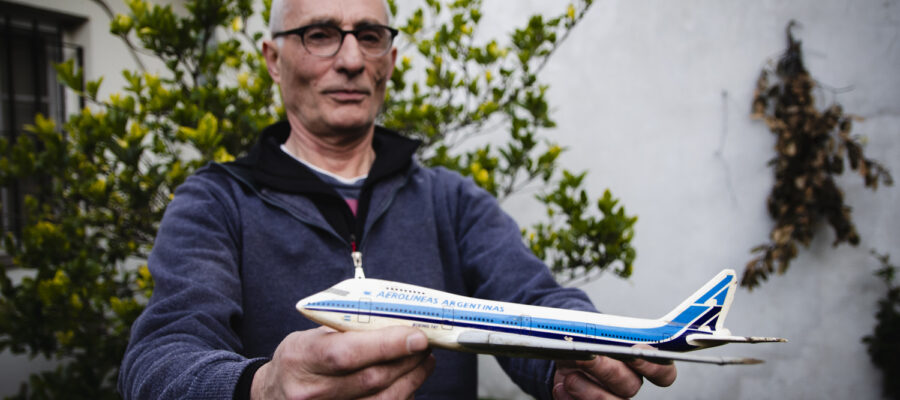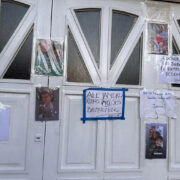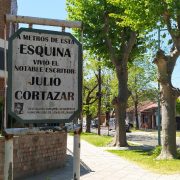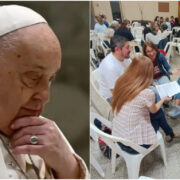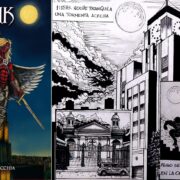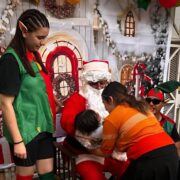Lara Lukaszewicz
Photographs by Andrés Álvarez for AUNO
Versión en Español
On April 4, 1976, a green Falcon—symbol of the terror perpetrated by the military dictatorship— waited outside Osvaldo López’s home. Just a week earlier, his best friend, Omar Cichero, had been murdered by the coup forces that had overthrown President María Estela Martínez de Perón.
López recounts his story from the comfort of his living room in Remedios de Escalada, on the outskirts of Buenos Aires. “I consider myself fortunate because I worked in a field I loved, which is not something that happens often,” he says to AUNO.
At 65, he has been retired for two months after a 44-year career with Aerolíneas Argentinas as an aircraft technician. He entered at 18 and his youth was the obvious first impression his colleagues used to give him a nickname: Lopecito.
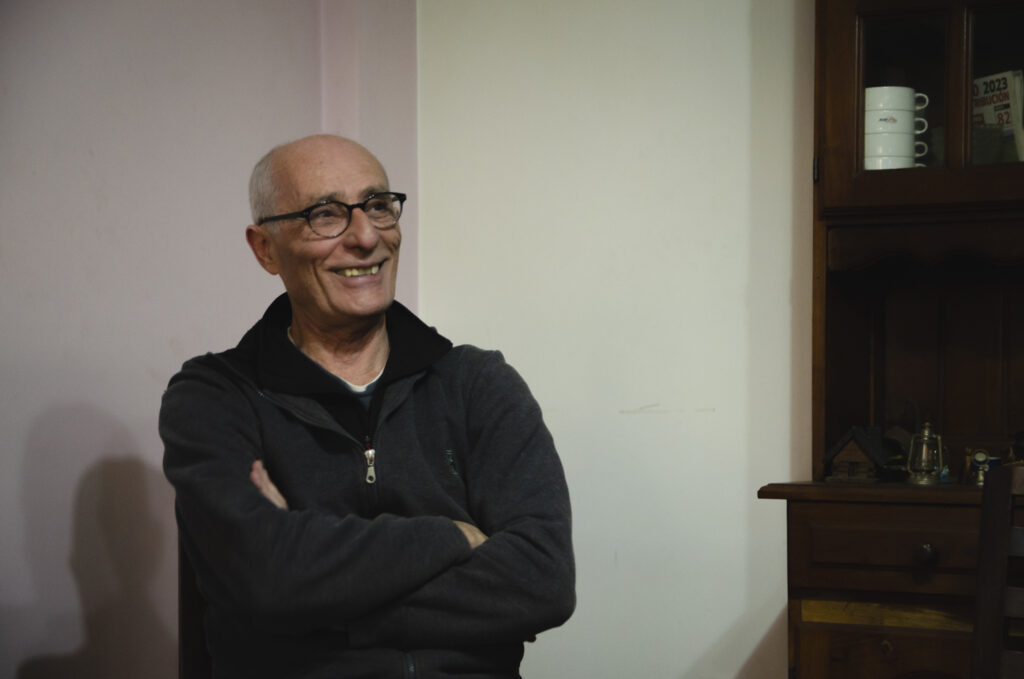
Lopecito sits at his Remedios de Escalada house
This state airline was established in 1950 by President Juan Domingo Perón and has experienced numerous ups and downs throughout its history.
“Do you know anyone who tattoos its company’s logo? I know over a thousand,” he says. He is among them, with the airline’s emblem on his left arm.
His job is complex, but he simplifies it by saying that an aircraft technician is the authorized person to “work on and touch an airplane.” As the one responsible for approving each flight, he must be on-site an hour before the crew and two hours before takeoff.
He adheres to a principle he learned when he joined Aerolíneas Argentinas and now passes on: «My concern isn’t that you depart, it’s that you arrive.” It’s a mantra often used in aviation.
“Medicine and aviation are the two professions where there are both civil and criminal penalties. A doctor can go to prison for a medical error. If it was discovered that I made a mistake, I would go to prison”, he warns.
Besides, the complexities of his job exceed technical aspects and ask for a special human dedication: “We technicians have antisocial hours: nights spent away from birthdays, Christmas, New Year’s, and family weekends”, he underlines.
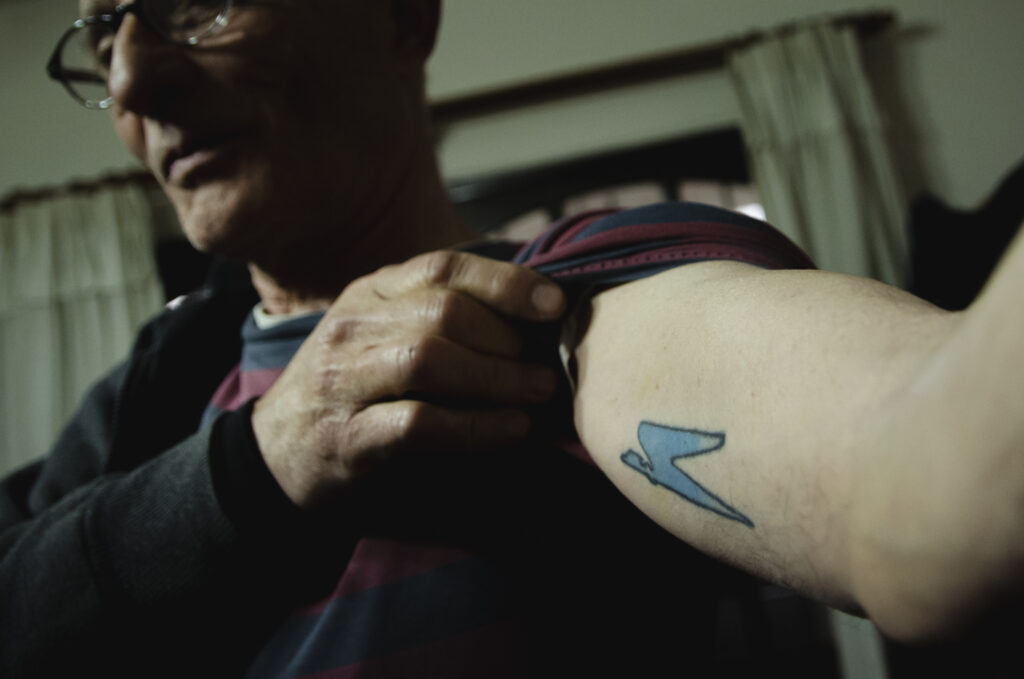
“When the Malvinas War (1982) came, Aerolíneas used to travel to the islands. There was no security; the armed forces guarded the hangars. There was no talk of strikes or meetings,” he recounts.
His connection with the company began in June 1980, during the country’s last military dictatorship, with three more years remaining until its end. “There’s a word we were taught when we were your age, in the midst of chaos: resist. You have to be smart and resist,” he says.
“Of the four hangars, number one was taken from the company and assigned to the Navy. From that hangar, the Electras carrying the death flights departed. We saw them. If you had a bit of imagination, you’d understand,” he recalls. These flights typically took place in the early morning hours.
The death flights were part of the systematic extermination plan carried out during the military regime from 1976 to 1983. Argentine Armed Forces planes would drop individuals into the Río de la Plata or the sea: their goal was to make them disappear.
He remembers working a schedule of six nights on and one off at that time. “By the fifth night, you’d be banging your head against the wall,” he jokes. With the return of democracy, his children arrived: Andrés in 1985, María Victoria in 1987, and Martín in the 1990s. He raised them with Fernanda, with whom he has shared flight since they were teens: they met volunteering at the Escalada Church in the early 70’s, where they contributed with the social work organized by Catholic Accion.
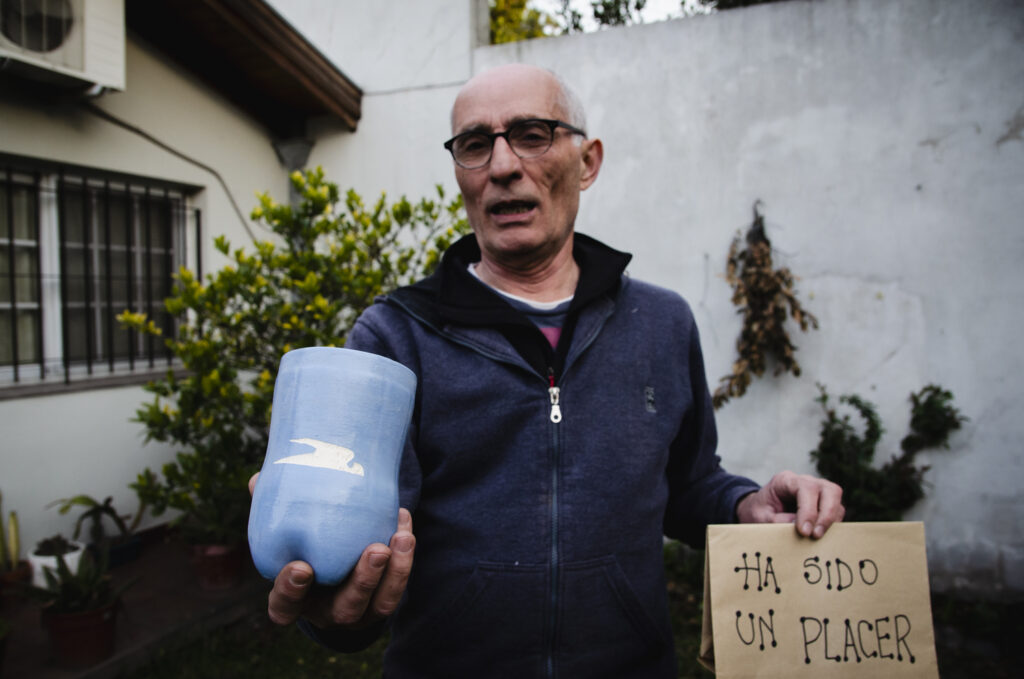
Under President Raúl Alfonsín, despite the democratic victory, salaries were low: “To give you an idea, our salary didn’t reach 50 dollars, while a 20-inch color television at the time costed 75 dollars.”
That was not the worst period for the company. During Carlos Menem’s presidency, in November 1990, Aerolíneas Argentinas was privatized. 85% of the company was transferred, with 10% remaining for the employees and 5% for the Argentine state. The buyer was a consortium led by the Spanish state airline Iberia, followed by Austral and private investors.
“It was symbolic. They took away the new planes. They dismantled it, almost causing its collapse. It was a time of protests; I brought my whole family. I was elected sector delegate for the first time,” he says of the beginning of his union trajectory.
The subsequent years were no lighter. “In 2003, we spent six days at the base, before Néstor Kirchner took office, guarding the planes to prevent any sabotage, like cutting an airplane’s cables. Six days. That year, we went five months without pay,” he recalls.
His youngest son, Martín, says that as a child, he only missed school to accompany his father to Aerolíneas Argentinas protests, even distributing stickers in classrooms.
For Osvaldo, the “rose petals” began to fall in 2005, when planes and buildings that had been sold were recovered. In 2008, the airline was re-nationalized under President Cristina Kirchner.
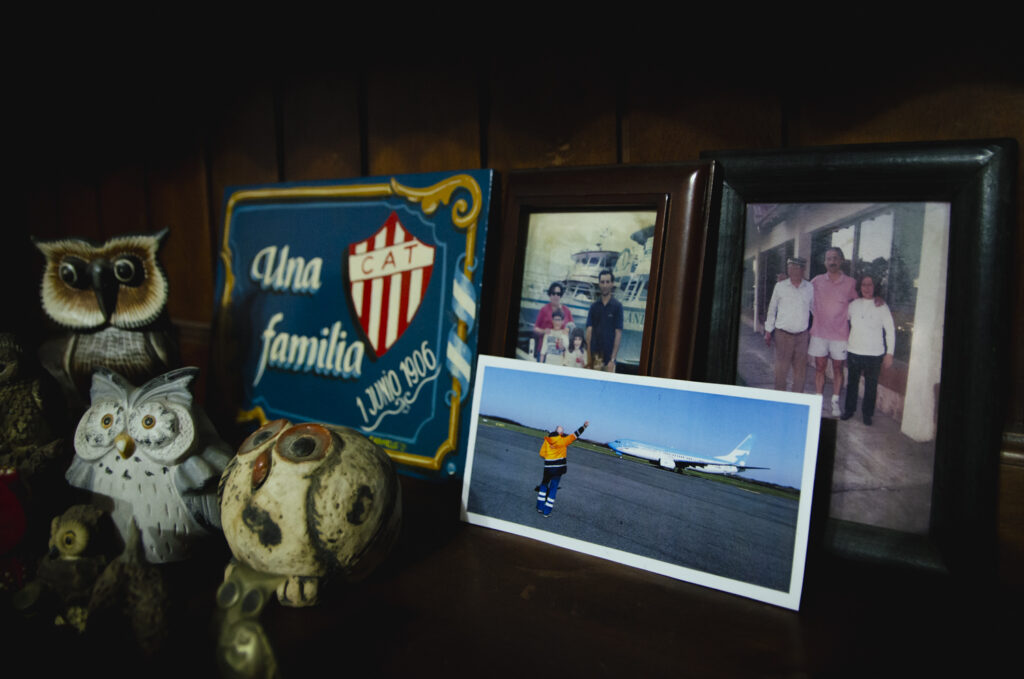
According to a Página 12 report, in 1990, before the sale, the company had 28 owned aircraft and one leased. By the time it was re-nationalized, only two international aircraft remained, along with a handful for domestic flights and 30 leased ones.
Regarding his job, he says it took him to places he might not have otherwise visited: Santa Cruz de la Sierra, Lima, Madrid, Rome, Barcelona, London, some parts of China, and even Ivory Coast. There, he learned to “open his mind.”
“I went to the most peripheral places, always talking with people, and there’s a common denominator: they think like us. A boy asked me why Europe and the United States were interested in keeping Africa, South America, and Asia underdeveloped. He was a 14-year-old, on the street, naked; partly in French, partly in Spanish,” he recounts of a trip to Ivory Coast.
Osvaldo hopes to write a book about his experiences, though he admits he doesn’t yet know how. He says he remains fully in touch with Aerolíneas Argentinas, but dreams of experiencing life without adhering to a schedule for the first time.
In a moment of confidentiality before the interview is over, Osvaldo reveals some of his colleagues’ nicknames: Headwind, Cane Field, Vinegar, The Calf, Aphid, Alf, Wooden Horse. The stories behind each name will also be part of history.
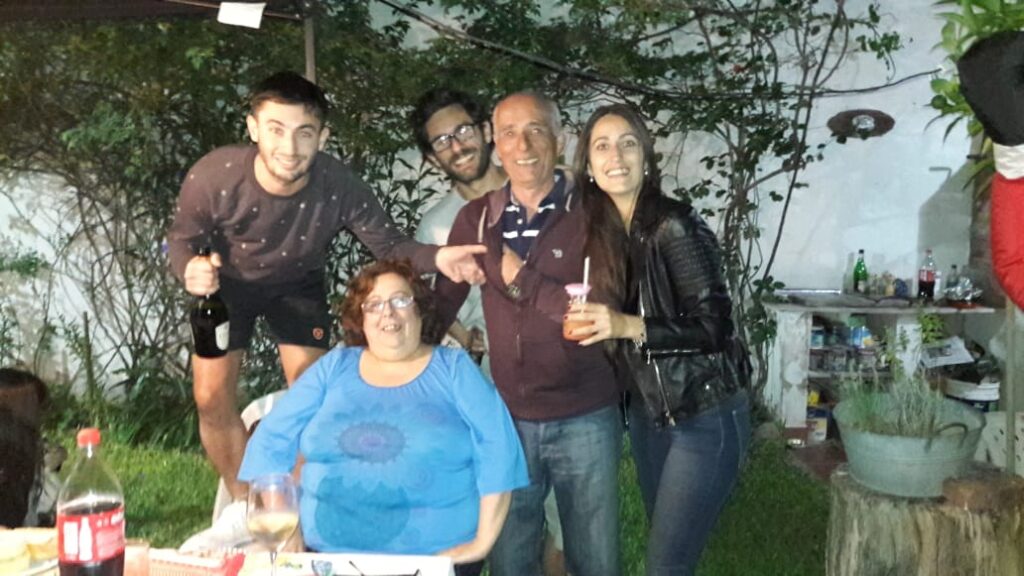
Actually this fraternal spirit is key for the skies veteran and his family: they all belong to Remedios de Escalada, they all belong to Talleres Club, and all of Osvaldo and Fernanda children attended to Escuela Nacional Antonio Mentruyt, a milestone por public education in the South of Greater Buenos Aires.
That’s why he was not going to get away on his last day of service without powerful emotions: “On my last day at work, I was given a farewell I hadn’t expected. I don’t want to get emotional, but it was something beautiful. I told them, ‘I don’t know if I deserve all this.’ And the response floored me. They said, ‘If we’re doing this, there must be a reason.’ And that left me speechless,” he concludes.
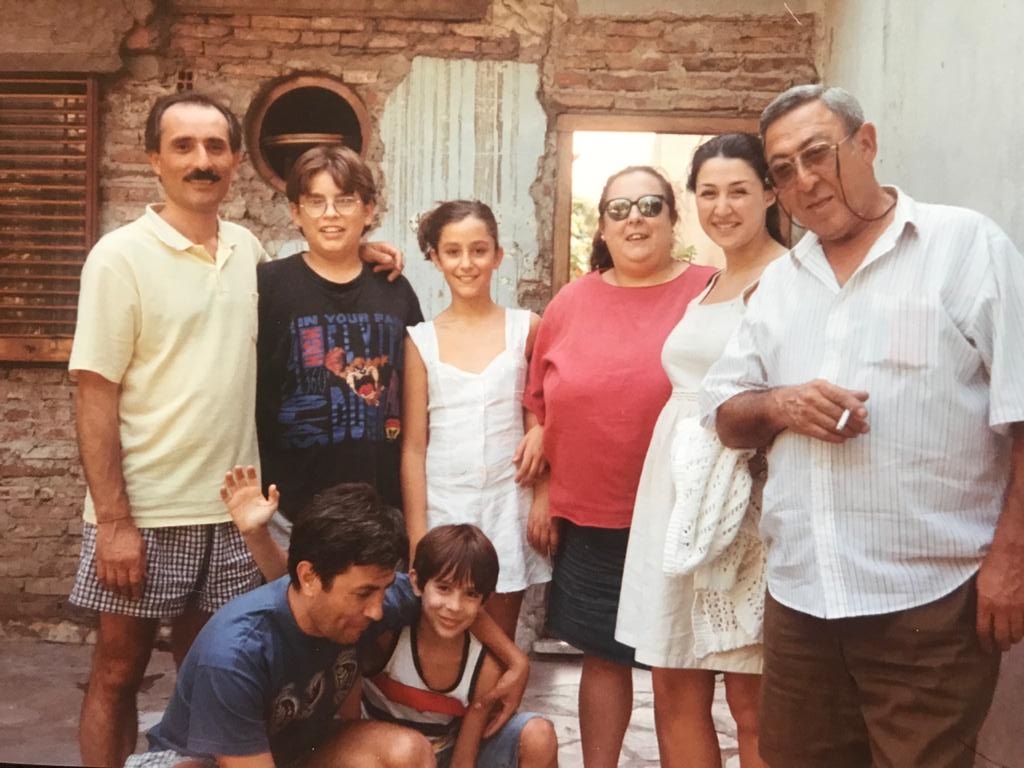
Text and images produced as part of AUNO’s English for Journalists and Introduction to Photojournalism workshops.
LL / AA / JJR

